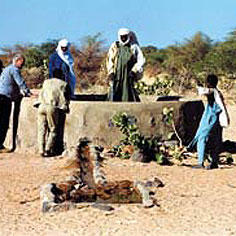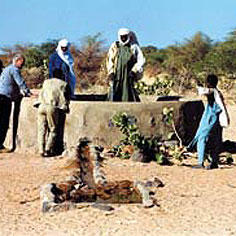
Humanitarian and Development
Place
Niger (Sahelian region), department of Maradi, district of Kornaka, Niger
Sponsor
Christian Arnould
Grant(s)
120,000 € over two years (half in 2004 and the remainder in 2005) to the Selection Committee at 2004/09/28
Project leader
« The experience and philosophy of Eau Vive means it involves local players as of project start-up. This ensures that users genuinely "buy into" the project and that the initiatives taken become long-term with optimum skill transfer. »
Christian Arnould
Summary
The NGO Eau Vive has been actively involved in many development projects in Sub-Saharan Africa since 1978: Burkina Faso, Mali, Senegal, Togo, etc. A team has been on the ground in Niger for the past five years helping villages to develop and improve living conditions for their inhabitants.
Involving local players right from the start

In the district of Kornaka, Eau Vive has worked hard to help 38 000 inhabitants in 51 villages, by means of a project scheduled for three years, from 2003 to 2005. This is a three-pronged initiative intended to improve the water supply to the local populace, foster hygiene and health prevention and consolidate the structures of village communities.
The Veolia Foundation was asked to help out with the first part of the "Kornaka" project and chose to grant it funding of 120,000 euros over two years, to fund the sinking of fifteen new wells, the rehabilitation of six cemented wells, and the installation of four water supply systems.
In parallel with the major structura work, Eau Vive trained local water point management committees which will soon be furnished with water monitoring and pricing tools to ensure their effective operation. Throughout the Kornaka district, improvements in water access were coupled with complementary initiatives to augment the benefits. For instance, a public awareness campaign was launched regarding hygiene, sanitary drainage, and the prevention of the principal endemic diseases (malaria, diarrhoea, respiratory infections) with women and children as the main targets. It helped to address nutrition-related issues. Moreover, in order to combat silting up and deforestation, the land surrounding the water points was planted with trees: production of seed, setting up of nurseries, land plantation and monitoring. All of these actions were implemented in collaboration with local associations active in the field of environmental conservation.
Progress report
Learning about collective water management
In March 2006, 23 new wells were already sunk and three old ones rehabilitated. The worksites to drill for boreholes were to begin in the villages of Ajékoria and Akoira-Idi. The management mode for the new water supply networks was the only stumbling block jeopardizing the project. As it happened, the village families, mostly extremely poor, were still reluctant to have to pay for the water, and the community bodies couldn't agree on the system for sharing the income produced by this new resource. These difficulties were subsequently solved.

